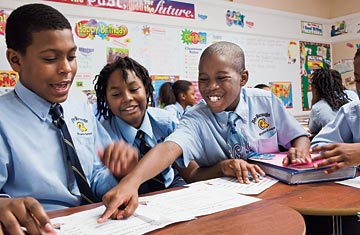
From left: Rodney Thomas, Tyreke Johnson and Malik Harris, at Burroughs Education Center in Washington, look at their payment vouchers
(6 of 9)
One clue came out of the interviews Fryer's team conducted with students in New York City. The students were universally excited about the money, and they wanted to earn more. They just didn't seem to know how. When researchers asked them how they could raise their scores, the kids mentioned test-taking strategies like reading the questions more carefully. But they didn't talk about the substantive work that leads to learning. "No one said they were going to stay after class and talk to the teacher," Fryer says. "Not one."
We tend to assume that kids (and adults) know how to achieve success. If they don't get there, it's for lack of effort--or talent. Sometimes that's true. But a lot of the time, people are just flying blind. John List, an economist at the University of Chicago, has noticed the disconnect in his own education experiments. He explains the problem to me this way: "I could ask you to solve a third-order linear partial differential equation," he says. "A what?" I ask. "A third-order linear partial differential equation," he says. "I could offer you a million dollars to solve it. And you can't do it." (He's right. I can't.) For some kids, doing better on a geometry test is like solving a third-order linear partial differential equation, no matter the incentive.
Similarly, in Chicago, kids were paid for grades--a result they could not always control. There, the findings were mixed. Kids who got paid did indeed get better grades, and they also attended class more--a week and a half more over the school year. That is a big deal, since nearly half of Chicago's high school kids drop out before they graduate and the kids who skip school and fail courses as freshmen tend to be the ones who drop out. We won't know until 2012 if the experiment lowered the dropout rate, but we do know that the rewards did not raise standardized-test scores.
So what happens if we pay kids to do tasks they know how to do? In Dallas, paying kids to read books--something almost all of them can do--made a big difference. In fact, the experiment had as big or bigger an effect on learning as many other reforms that have been tested, like lowering class size or enrolling kids in Head Start early-education programs (both of which cost thousands of dollars more per student). And the experiment also boosted kids' grades. "If you pay a kid to read books, their grades go up higher than if you actually pay a kid for grades, like we did in Chicago," Fryer says. "Isn't that cool?"
It may also help that the kids in Dallas were the youngest in the experiment, making them more receptive to reforms. It's hard to know for sure. Another caveat is that the Dallas model worked differently on different kids. Most (including Hispanic kids and poor kids) did better when they were being paid. But the ones who spoke very little English and took their standardized tests in Spanish did not benefit from the incentives, a mystery that Fryer addresses at some length in his study but cannot entirely explain.
